Case Study: Binding Pre-Contractual Negotiations Under ACCA Law
VerifiedAdded on 2023/06/11
|9
|2194
|62
Case Study
AI Summary
This case study delves into the legal implications of pre-contractual negotiations, focusing on a scenario where an employee, Max, was promised access to a generous employee share scheme during negotiations but was later informed of a two-year service requirement. The analysis applies relevant sections of the Australian Competition and Consumer Act (ACCA), particularly Section 18(1) concerning misleading and deceptive conduct, and references case law such as Barto v GPR management Services Pte Ltd and Stoelwinder v Southern Health Care Network to argue that pre-contractual negotiations are binding. The study concludes that Max has a legal right to access the scheme and potentially obtain compensation. It further explores whether the outcome would differ if the promise was made six months after Max started work, highlighting the importance of clear and definite contract terms.
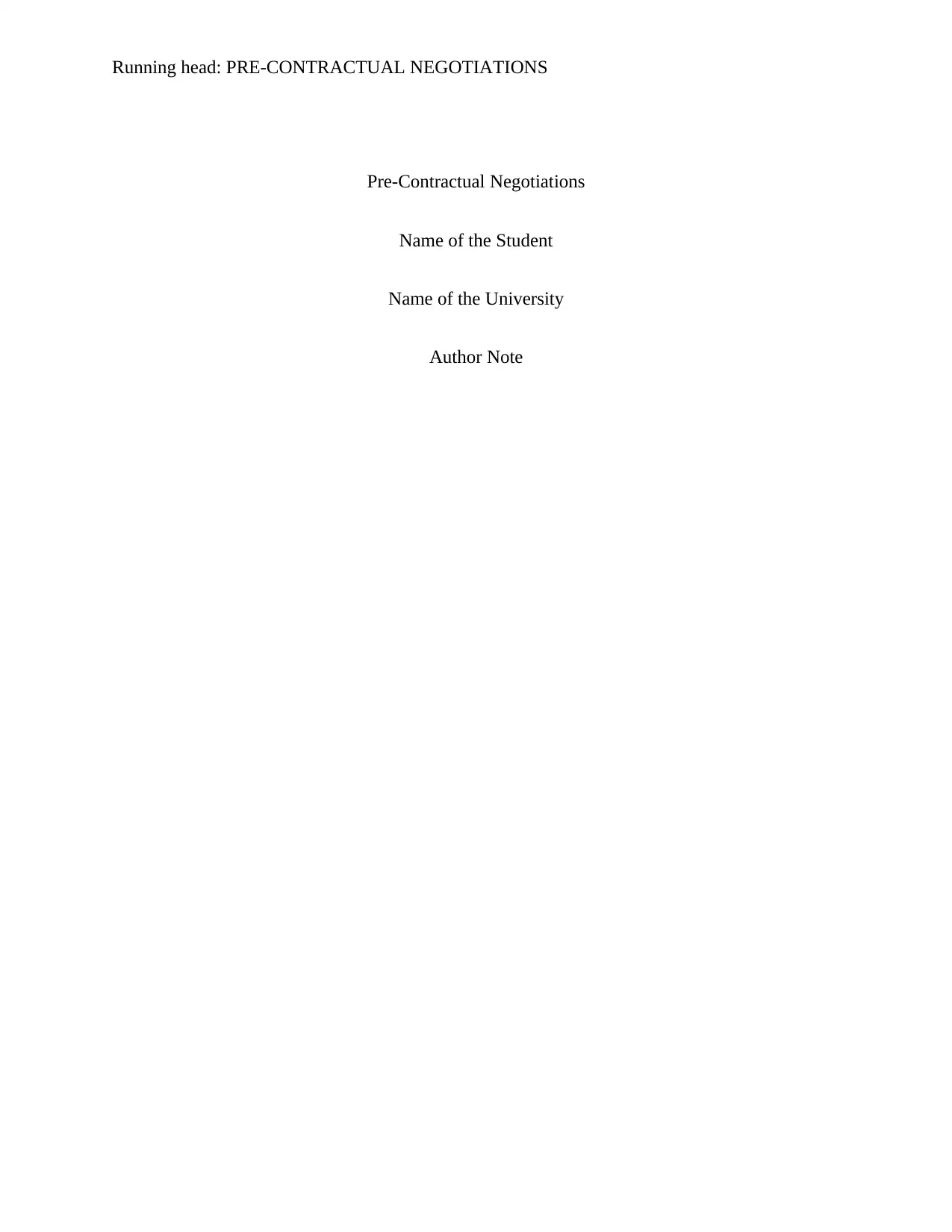
Running head: PRE-CONTRACTUAL NEGOTIATIONS
Pre-Contractual Negotiations
Name of the Student
Name of the University
Author Note
Pre-Contractual Negotiations
Name of the Student
Name of the University
Author Note
Paraphrase This Document
Need a fresh take? Get an instant paraphrase of this document with our AI Paraphraser
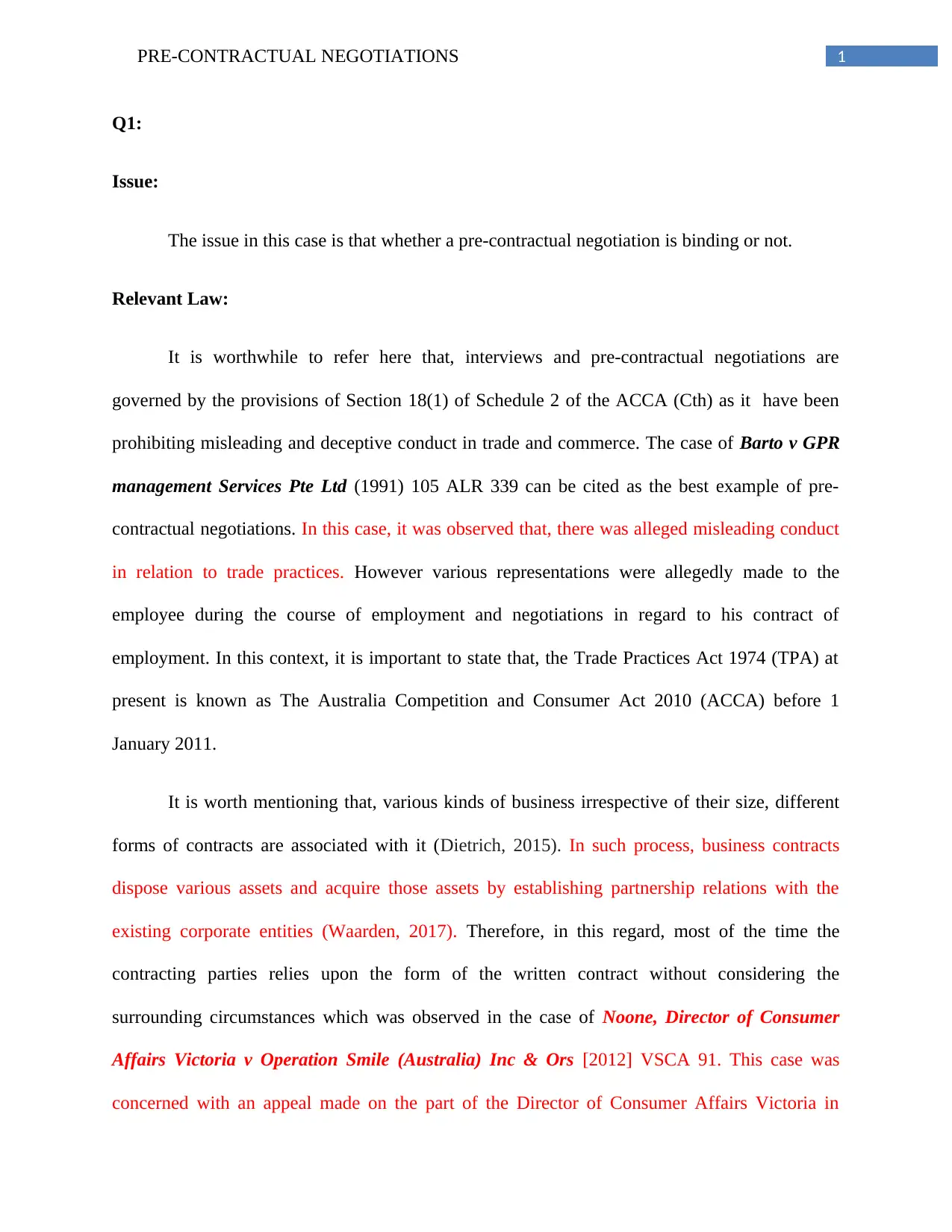
1PRE-CONTRACTUAL NEGOTIATIONS
Q1:
Issue:
The issue in this case is that whether a pre-contractual negotiation is binding or not.
Relevant Law:
It is worthwhile to refer here that, interviews and pre-contractual negotiations are
governed by the provisions of Section 18(1) of Schedule 2 of the ACCA (Cth) as it have been
prohibiting misleading and deceptive conduct in trade and commerce. The case of Barto v GPR
management Services Pte Ltd (1991) 105 ALR 339 can be cited as the best example of pre-
contractual negotiations. In this case, it was observed that, there was alleged misleading conduct
in relation to trade practices. However various representations were allegedly made to the
employee during the course of employment and negotiations in regard to his contract of
employment. In this context, it is important to state that, the Trade Practices Act 1974 (TPA) at
present is known as The Australia Competition and Consumer Act 2010 (ACCA) before 1
January 2011.
It is worth mentioning that, various kinds of business irrespective of their size, different
forms of contracts are associated with it (Dietrich, 2015). In such process, business contracts
dispose various assets and acquire those assets by establishing partnership relations with the
existing corporate entities (Waarden, 2017). Therefore, in this regard, most of the time the
contracting parties relies upon the form of the written contract without considering the
surrounding circumstances which was observed in the case of Noone, Director of Consumer
Affairs Victoria v Operation Smile (Australia) Inc & Ors [2012] VSCA 91. This case was
concerned with an appeal made on the part of the Director of Consumer Affairs Victoria in
Q1:
Issue:
The issue in this case is that whether a pre-contractual negotiation is binding or not.
Relevant Law:
It is worthwhile to refer here that, interviews and pre-contractual negotiations are
governed by the provisions of Section 18(1) of Schedule 2 of the ACCA (Cth) as it have been
prohibiting misleading and deceptive conduct in trade and commerce. The case of Barto v GPR
management Services Pte Ltd (1991) 105 ALR 339 can be cited as the best example of pre-
contractual negotiations. In this case, it was observed that, there was alleged misleading conduct
in relation to trade practices. However various representations were allegedly made to the
employee during the course of employment and negotiations in regard to his contract of
employment. In this context, it is important to state that, the Trade Practices Act 1974 (TPA) at
present is known as The Australia Competition and Consumer Act 2010 (ACCA) before 1
January 2011.
It is worth mentioning that, various kinds of business irrespective of their size, different
forms of contracts are associated with it (Dietrich, 2015). In such process, business contracts
dispose various assets and acquire those assets by establishing partnership relations with the
existing corporate entities (Waarden, 2017). Therefore, in this regard, most of the time the
contracting parties relies upon the form of the written contract without considering the
surrounding circumstances which was observed in the case of Noone, Director of Consumer
Affairs Victoria v Operation Smile (Australia) Inc & Ors [2012] VSCA 91. This case was
concerned with an appeal made on the part of the Director of Consumer Affairs Victoria in
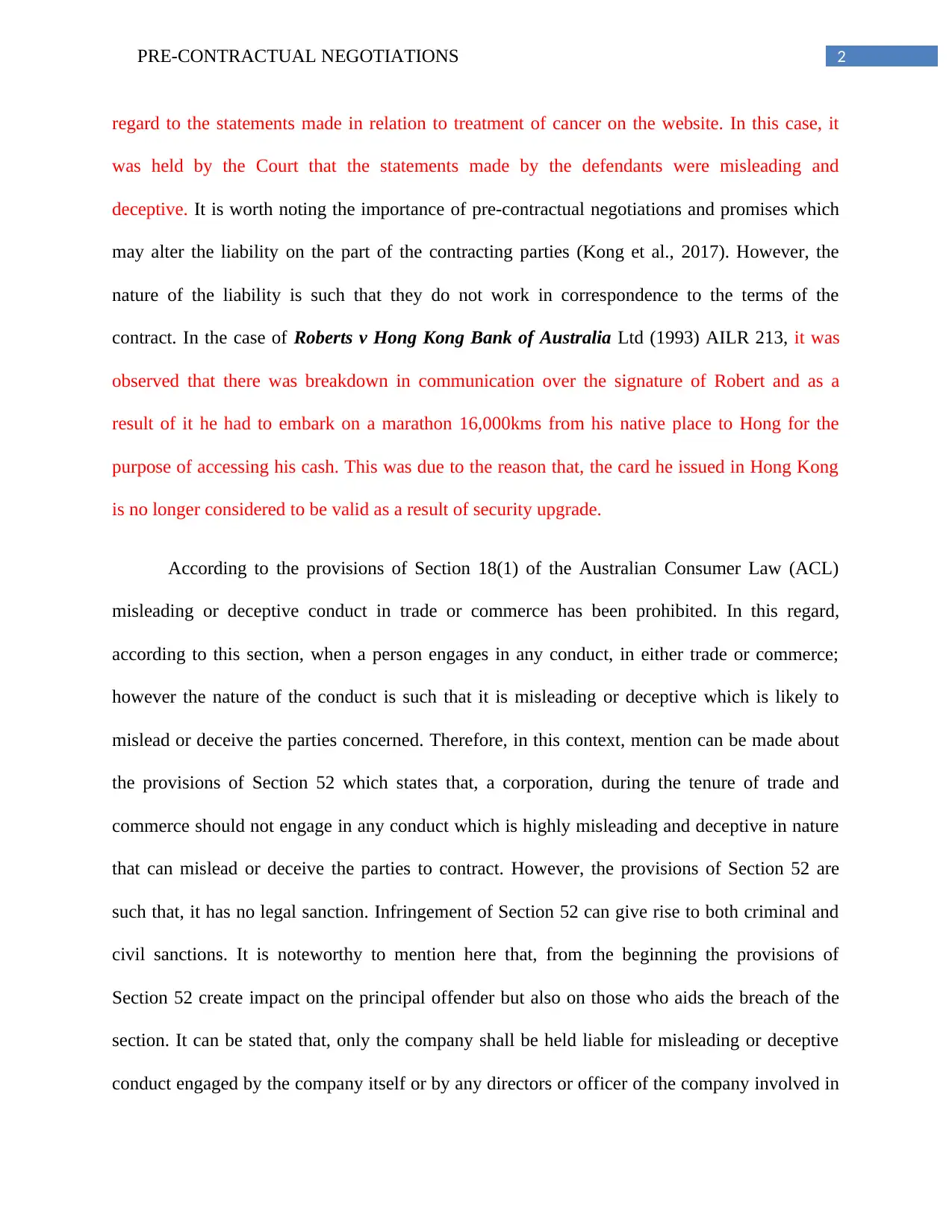
2PRE-CONTRACTUAL NEGOTIATIONS
regard to the statements made in relation to treatment of cancer on the website. In this case, it
was held by the Court that the statements made by the defendants were misleading and
deceptive. It is worth noting the importance of pre-contractual negotiations and promises which
may alter the liability on the part of the contracting parties (Kong et al., 2017). However, the
nature of the liability is such that they do not work in correspondence to the terms of the
contract. In the case of Roberts v Hong Kong Bank of Australia Ltd (1993) AILR 213, it was
observed that there was breakdown in communication over the signature of Robert and as a
result of it he had to embark on a marathon 16,000kms from his native place to Hong for the
purpose of accessing his cash. This was due to the reason that, the card he issued in Hong Kong
is no longer considered to be valid as a result of security upgrade.
According to the provisions of Section 18(1) of the Australian Consumer Law (ACL)
misleading or deceptive conduct in trade or commerce has been prohibited. In this regard,
according to this section, when a person engages in any conduct, in either trade or commerce;
however the nature of the conduct is such that it is misleading or deceptive which is likely to
mislead or deceive the parties concerned. Therefore, in this context, mention can be made about
the provisions of Section 52 which states that, a corporation, during the tenure of trade and
commerce should not engage in any conduct which is highly misleading and deceptive in nature
that can mislead or deceive the parties to contract. However, the provisions of Section 52 are
such that, it has no legal sanction. Infringement of Section 52 can give rise to both criminal and
civil sanctions. It is noteworthy to mention here that, from the beginning the provisions of
Section 52 create impact on the principal offender but also on those who aids the breach of the
section. It can be stated that, only the company shall be held liable for misleading or deceptive
conduct engaged by the company itself or by any directors or officer of the company involved in
regard to the statements made in relation to treatment of cancer on the website. In this case, it
was held by the Court that the statements made by the defendants were misleading and
deceptive. It is worth noting the importance of pre-contractual negotiations and promises which
may alter the liability on the part of the contracting parties (Kong et al., 2017). However, the
nature of the liability is such that they do not work in correspondence to the terms of the
contract. In the case of Roberts v Hong Kong Bank of Australia Ltd (1993) AILR 213, it was
observed that there was breakdown in communication over the signature of Robert and as a
result of it he had to embark on a marathon 16,000kms from his native place to Hong for the
purpose of accessing his cash. This was due to the reason that, the card he issued in Hong Kong
is no longer considered to be valid as a result of security upgrade.
According to the provisions of Section 18(1) of the Australian Consumer Law (ACL)
misleading or deceptive conduct in trade or commerce has been prohibited. In this regard,
according to this section, when a person engages in any conduct, in either trade or commerce;
however the nature of the conduct is such that it is misleading or deceptive which is likely to
mislead or deceive the parties concerned. Therefore, in this context, mention can be made about
the provisions of Section 52 which states that, a corporation, during the tenure of trade and
commerce should not engage in any conduct which is highly misleading and deceptive in nature
that can mislead or deceive the parties to contract. However, the provisions of Section 52 are
such that, it has no legal sanction. Infringement of Section 52 can give rise to both criminal and
civil sanctions. It is noteworthy to mention here that, from the beginning the provisions of
Section 52 create impact on the principal offender but also on those who aids the breach of the
section. It can be stated that, only the company shall be held liable for misleading or deceptive
conduct engaged by the company itself or by any directors or officer of the company involved in
⊘ This is a preview!⊘
Do you want full access?
Subscribe today to unlock all pages.

Trusted by 1+ million students worldwide
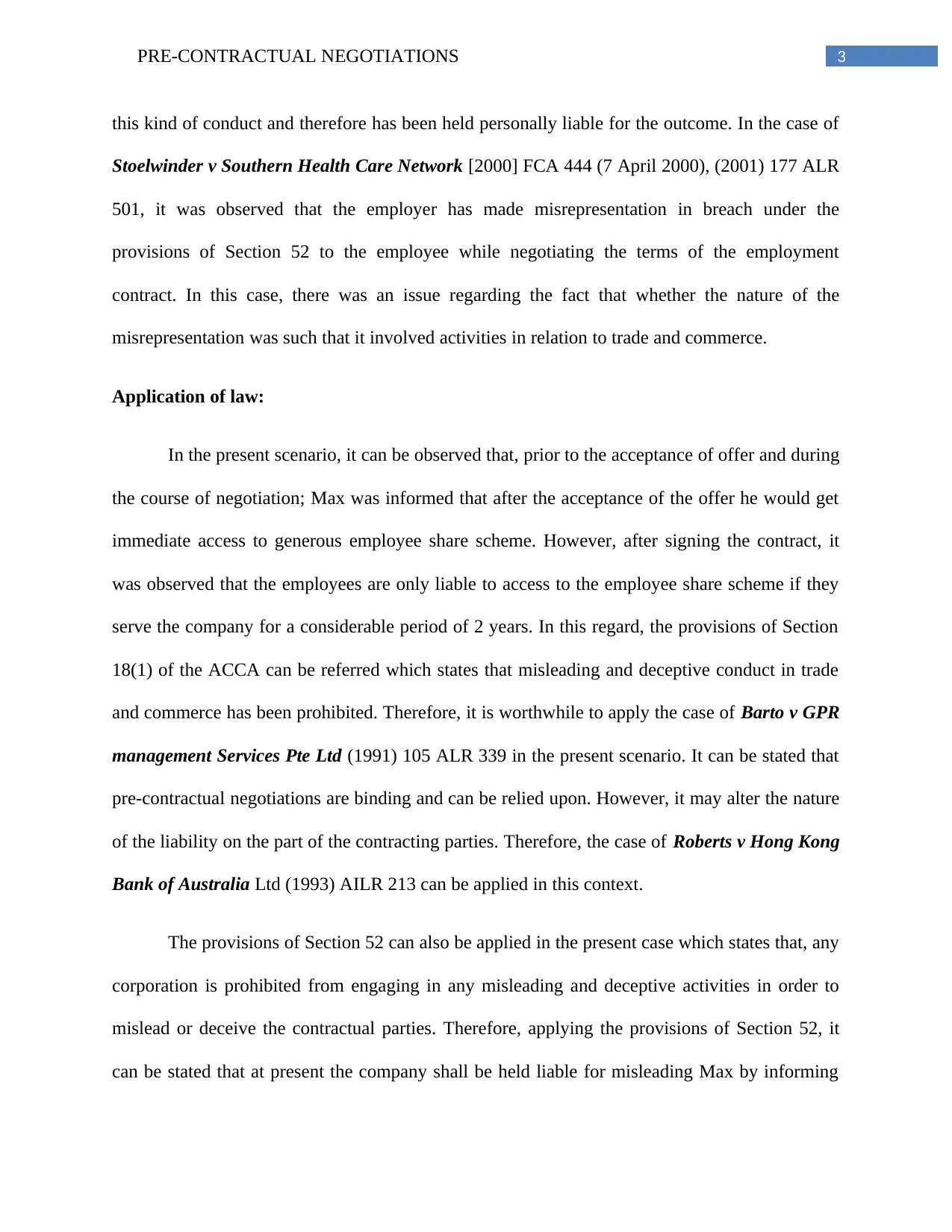
3PRE-CONTRACTUAL NEGOTIATIONS
this kind of conduct and therefore has been held personally liable for the outcome. In the case of
Stoelwinder v Southern Health Care Network [2000] FCA 444 (7 April 2000), (2001) 177 ALR
501, it was observed that the employer has made misrepresentation in breach under the
provisions of Section 52 to the employee while negotiating the terms of the employment
contract. In this case, there was an issue regarding the fact that whether the nature of the
misrepresentation was such that it involved activities in relation to trade and commerce.
Application of law:
In the present scenario, it can be observed that, prior to the acceptance of offer and during
the course of negotiation; Max was informed that after the acceptance of the offer he would get
immediate access to generous employee share scheme. However, after signing the contract, it
was observed that the employees are only liable to access to the employee share scheme if they
serve the company for a considerable period of 2 years. In this regard, the provisions of Section
18(1) of the ACCA can be referred which states that misleading and deceptive conduct in trade
and commerce has been prohibited. Therefore, it is worthwhile to apply the case of Barto v GPR
management Services Pte Ltd (1991) 105 ALR 339 in the present scenario. It can be stated that
pre-contractual negotiations are binding and can be relied upon. However, it may alter the nature
of the liability on the part of the contracting parties. Therefore, the case of Roberts v Hong Kong
Bank of Australia Ltd (1993) AILR 213 can be applied in this context.
The provisions of Section 52 can also be applied in the present case which states that, any
corporation is prohibited from engaging in any misleading and deceptive activities in order to
mislead or deceive the contractual parties. Therefore, applying the provisions of Section 52, it
can be stated that at present the company shall be held liable for misleading Max by informing
this kind of conduct and therefore has been held personally liable for the outcome. In the case of
Stoelwinder v Southern Health Care Network [2000] FCA 444 (7 April 2000), (2001) 177 ALR
501, it was observed that the employer has made misrepresentation in breach under the
provisions of Section 52 to the employee while negotiating the terms of the employment
contract. In this case, there was an issue regarding the fact that whether the nature of the
misrepresentation was such that it involved activities in relation to trade and commerce.
Application of law:
In the present scenario, it can be observed that, prior to the acceptance of offer and during
the course of negotiation; Max was informed that after the acceptance of the offer he would get
immediate access to generous employee share scheme. However, after signing the contract, it
was observed that the employees are only liable to access to the employee share scheme if they
serve the company for a considerable period of 2 years. In this regard, the provisions of Section
18(1) of the ACCA can be referred which states that misleading and deceptive conduct in trade
and commerce has been prohibited. Therefore, it is worthwhile to apply the case of Barto v GPR
management Services Pte Ltd (1991) 105 ALR 339 in the present scenario. It can be stated that
pre-contractual negotiations are binding and can be relied upon. However, it may alter the nature
of the liability on the part of the contracting parties. Therefore, the case of Roberts v Hong Kong
Bank of Australia Ltd (1993) AILR 213 can be applied in this context.
The provisions of Section 52 can also be applied in the present case which states that, any
corporation is prohibited from engaging in any misleading and deceptive activities in order to
mislead or deceive the contractual parties. Therefore, applying the provisions of Section 52, it
can be stated that at present the company shall be held liable for misleading Max by informing
Paraphrase This Document
Need a fresh take? Get an instant paraphrase of this document with our AI Paraphraser
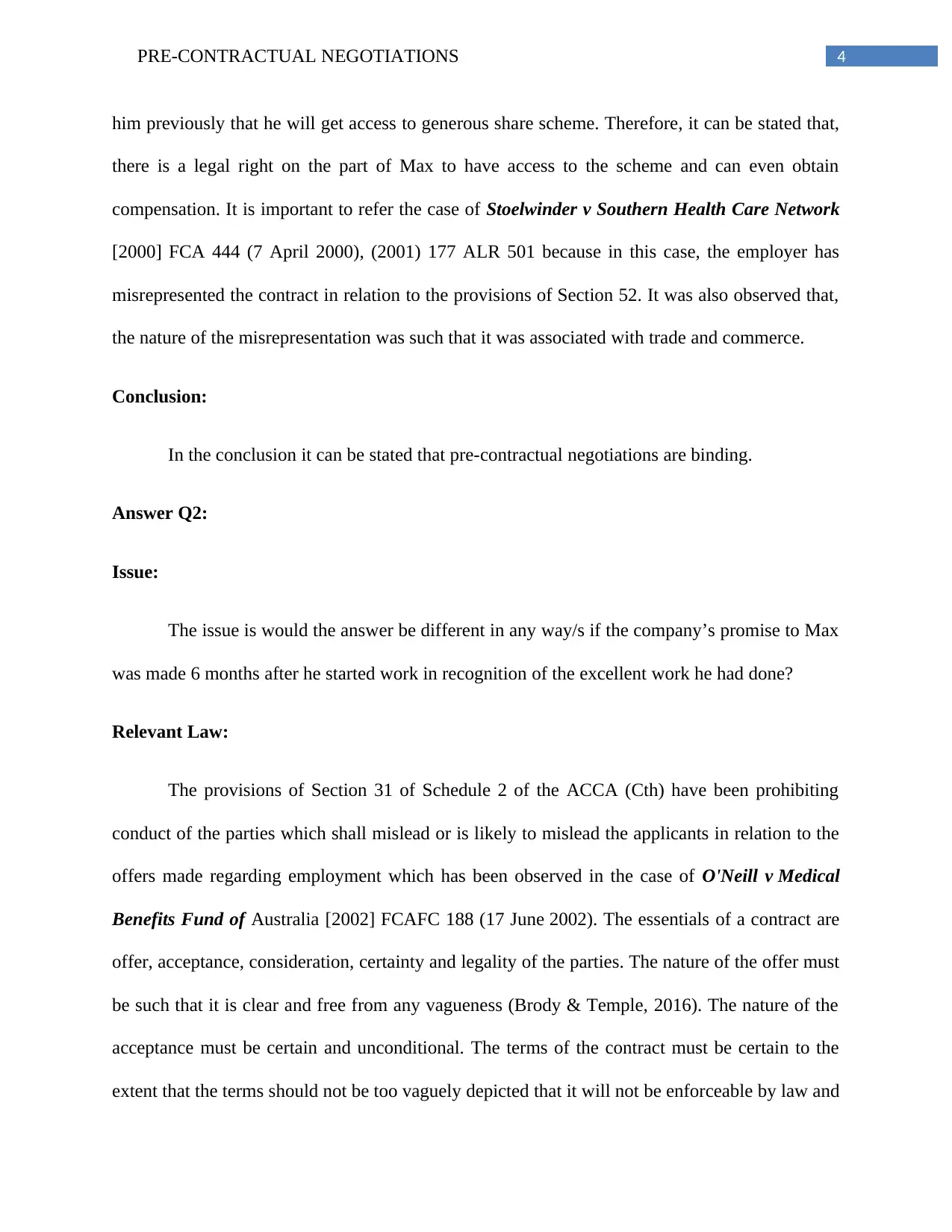
4PRE-CONTRACTUAL NEGOTIATIONS
him previously that he will get access to generous share scheme. Therefore, it can be stated that,
there is a legal right on the part of Max to have access to the scheme and can even obtain
compensation. It is important to refer the case of Stoelwinder v Southern Health Care Network
[2000] FCA 444 (7 April 2000), (2001) 177 ALR 501 because in this case, the employer has
misrepresented the contract in relation to the provisions of Section 52. It was also observed that,
the nature of the misrepresentation was such that it was associated with trade and commerce.
Conclusion:
In the conclusion it can be stated that pre-contractual negotiations are binding.
Answer Q2:
Issue:
The issue is would the answer be different in any way/s if the company’s promise to Max
was made 6 months after he started work in recognition of the excellent work he had done?
Relevant Law:
The provisions of Section 31 of Schedule 2 of the ACCA (Cth) have been prohibiting
conduct of the parties which shall mislead or is likely to mislead the applicants in relation to the
offers made regarding employment which has been observed in the case of O'Neill v Medical
Benefits Fund of Australia [2002] FCAFC 188 (17 June 2002). The essentials of a contract are
offer, acceptance, consideration, certainty and legality of the parties. The nature of the offer must
be such that it is clear and free from any vagueness (Brody & Temple, 2016). The nature of the
acceptance must be certain and unconditional. The terms of the contract must be certain to the
extent that the terms should not be too vaguely depicted that it will not be enforceable by law and
him previously that he will get access to generous share scheme. Therefore, it can be stated that,
there is a legal right on the part of Max to have access to the scheme and can even obtain
compensation. It is important to refer the case of Stoelwinder v Southern Health Care Network
[2000] FCA 444 (7 April 2000), (2001) 177 ALR 501 because in this case, the employer has
misrepresented the contract in relation to the provisions of Section 52. It was also observed that,
the nature of the misrepresentation was such that it was associated with trade and commerce.
Conclusion:
In the conclusion it can be stated that pre-contractual negotiations are binding.
Answer Q2:
Issue:
The issue is would the answer be different in any way/s if the company’s promise to Max
was made 6 months after he started work in recognition of the excellent work he had done?
Relevant Law:
The provisions of Section 31 of Schedule 2 of the ACCA (Cth) have been prohibiting
conduct of the parties which shall mislead or is likely to mislead the applicants in relation to the
offers made regarding employment which has been observed in the case of O'Neill v Medical
Benefits Fund of Australia [2002] FCAFC 188 (17 June 2002). The essentials of a contract are
offer, acceptance, consideration, certainty and legality of the parties. The nature of the offer must
be such that it is clear and free from any vagueness (Brody & Temple, 2016). The nature of the
acceptance must be certain and unconditional. The terms of the contract must be certain to the
extent that the terms should not be too vaguely depicted that it will not be enforceable by law and
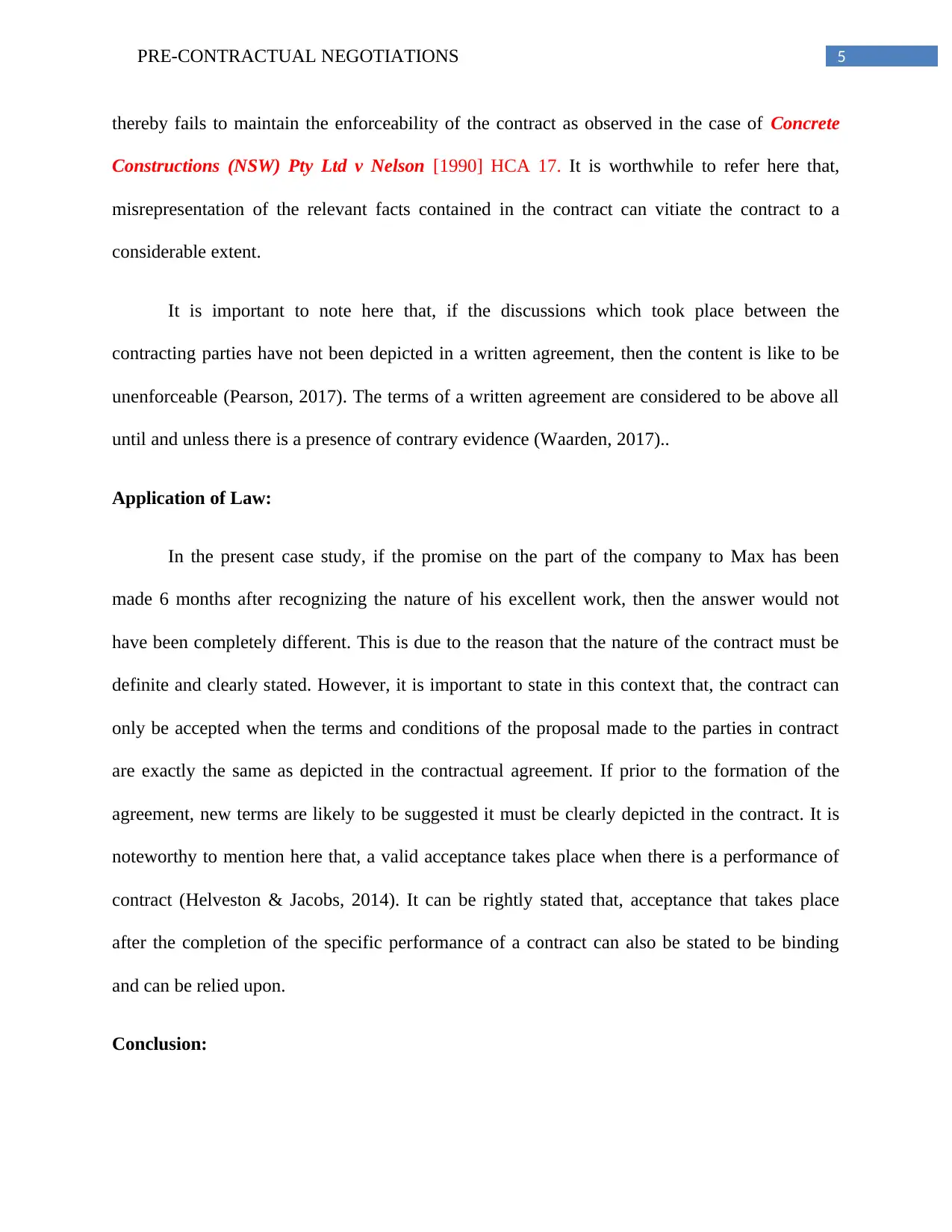
5PRE-CONTRACTUAL NEGOTIATIONS
thereby fails to maintain the enforceability of the contract as observed in the case of Concrete
Constructions (NSW) Pty Ltd v Nelson [1990] HCA 17. It is worthwhile to refer here that,
misrepresentation of the relevant facts contained in the contract can vitiate the contract to a
considerable extent.
It is important to note here that, if the discussions which took place between the
contracting parties have not been depicted in a written agreement, then the content is like to be
unenforceable (Pearson, 2017). The terms of a written agreement are considered to be above all
until and unless there is a presence of contrary evidence (Waarden, 2017)..
Application of Law:
In the present case study, if the promise on the part of the company to Max has been
made 6 months after recognizing the nature of his excellent work, then the answer would not
have been completely different. This is due to the reason that the nature of the contract must be
definite and clearly stated. However, it is important to state in this context that, the contract can
only be accepted when the terms and conditions of the proposal made to the parties in contract
are exactly the same as depicted in the contractual agreement. If prior to the formation of the
agreement, new terms are likely to be suggested it must be clearly depicted in the contract. It is
noteworthy to mention here that, a valid acceptance takes place when there is a performance of
contract (Helveston & Jacobs, 2014). It can be rightly stated that, acceptance that takes place
after the completion of the specific performance of a contract can also be stated to be binding
and can be relied upon.
Conclusion:
thereby fails to maintain the enforceability of the contract as observed in the case of Concrete
Constructions (NSW) Pty Ltd v Nelson [1990] HCA 17. It is worthwhile to refer here that,
misrepresentation of the relevant facts contained in the contract can vitiate the contract to a
considerable extent.
It is important to note here that, if the discussions which took place between the
contracting parties have not been depicted in a written agreement, then the content is like to be
unenforceable (Pearson, 2017). The terms of a written agreement are considered to be above all
until and unless there is a presence of contrary evidence (Waarden, 2017)..
Application of Law:
In the present case study, if the promise on the part of the company to Max has been
made 6 months after recognizing the nature of his excellent work, then the answer would not
have been completely different. This is due to the reason that the nature of the contract must be
definite and clearly stated. However, it is important to state in this context that, the contract can
only be accepted when the terms and conditions of the proposal made to the parties in contract
are exactly the same as depicted in the contractual agreement. If prior to the formation of the
agreement, new terms are likely to be suggested it must be clearly depicted in the contract. It is
noteworthy to mention here that, a valid acceptance takes place when there is a performance of
contract (Helveston & Jacobs, 2014). It can be rightly stated that, acceptance that takes place
after the completion of the specific performance of a contract can also be stated to be binding
and can be relied upon.
Conclusion:
⊘ This is a preview!⊘
Do you want full access?
Subscribe today to unlock all pages.

Trusted by 1+ million students worldwide
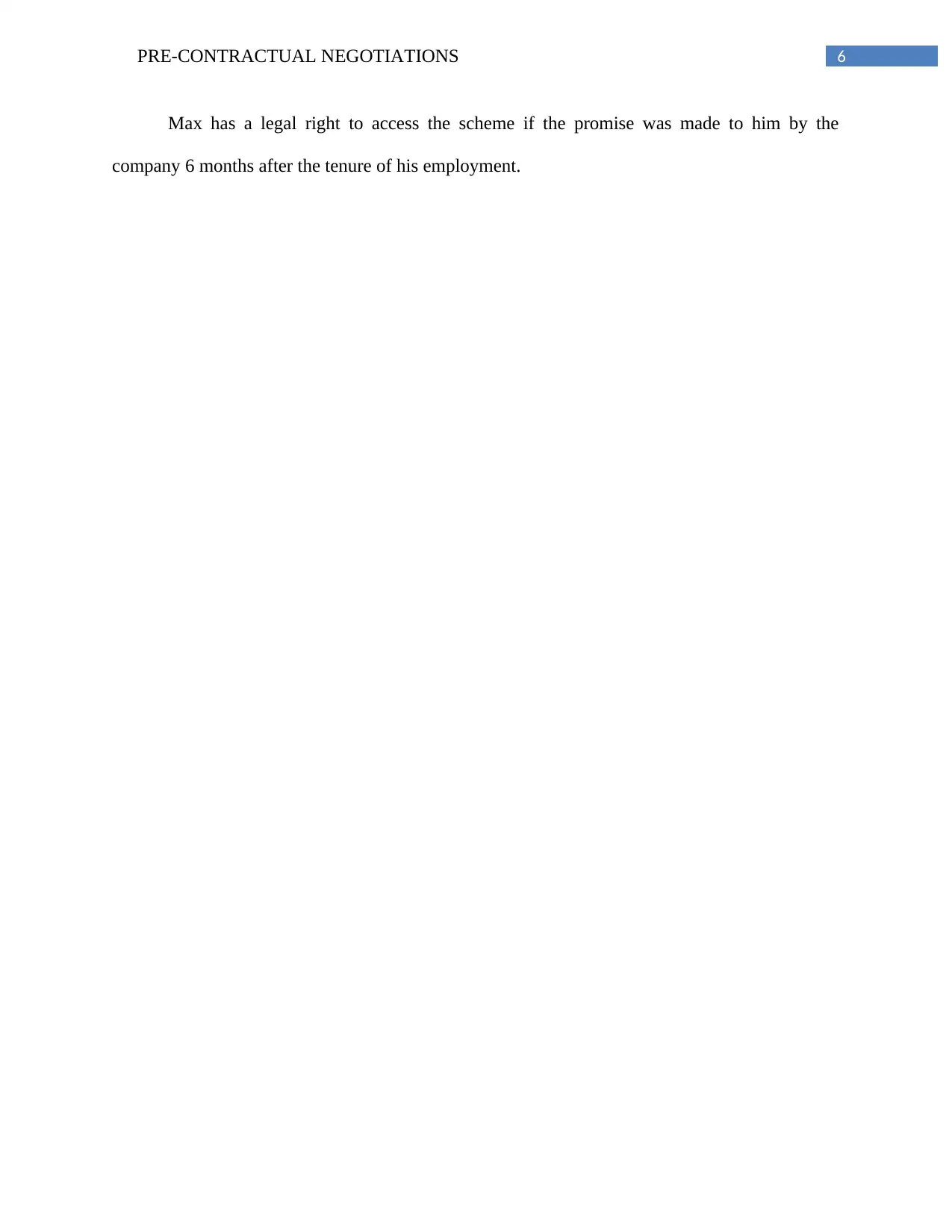
6PRE-CONTRACTUAL NEGOTIATIONS
Max has a legal right to access the scheme if the promise was made to him by the
company 6 months after the tenure of his employment.
Max has a legal right to access the scheme if the promise was made to him by the
company 6 months after the tenure of his employment.
Paraphrase This Document
Need a fresh take? Get an instant paraphrase of this document with our AI Paraphraser
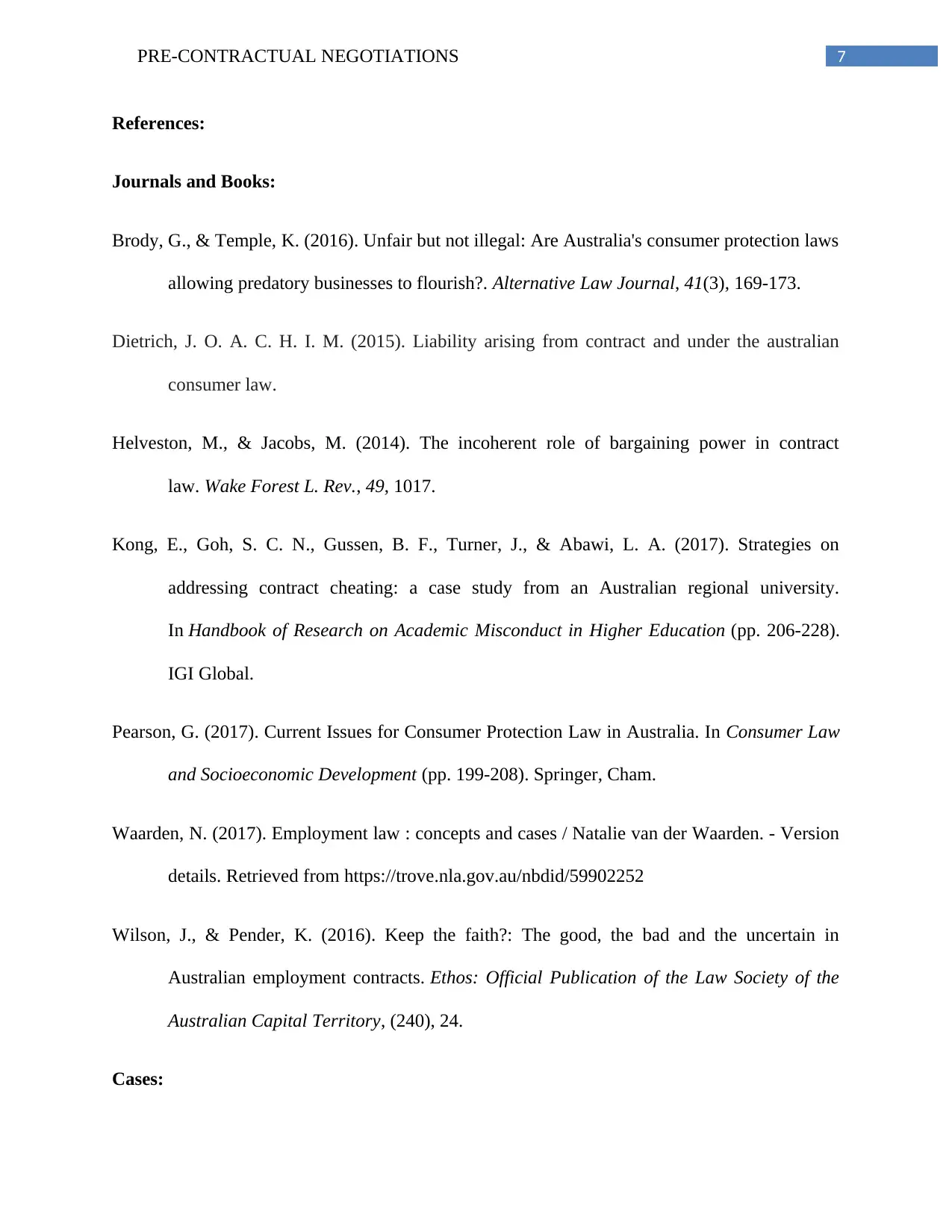
7PRE-CONTRACTUAL NEGOTIATIONS
References:
Journals and Books:
Brody, G., & Temple, K. (2016). Unfair but not illegal: Are Australia's consumer protection laws
allowing predatory businesses to flourish?. Alternative Law Journal, 41(3), 169-173.
Dietrich, J. O. A. C. H. I. M. (2015). Liability arising from contract and under the australian
consumer law.
Helveston, M., & Jacobs, M. (2014). The incoherent role of bargaining power in contract
law. Wake Forest L. Rev., 49, 1017.
Kong, E., Goh, S. C. N., Gussen, B. F., Turner, J., & Abawi, L. A. (2017). Strategies on
addressing contract cheating: a case study from an Australian regional university.
In Handbook of Research on Academic Misconduct in Higher Education (pp. 206-228).
IGI Global.
Pearson, G. (2017). Current Issues for Consumer Protection Law in Australia. In Consumer Law
and Socioeconomic Development (pp. 199-208). Springer, Cham.
Waarden, N. (2017). Employment law : concepts and cases / Natalie van der Waarden. - Version
details. Retrieved from https://trove.nla.gov.au/nbdid/59902252
Wilson, J., & Pender, K. (2016). Keep the faith?: The good, the bad and the uncertain in
Australian employment contracts. Ethos: Official Publication of the Law Society of the
Australian Capital Territory, (240), 24.
Cases:
References:
Journals and Books:
Brody, G., & Temple, K. (2016). Unfair but not illegal: Are Australia's consumer protection laws
allowing predatory businesses to flourish?. Alternative Law Journal, 41(3), 169-173.
Dietrich, J. O. A. C. H. I. M. (2015). Liability arising from contract and under the australian
consumer law.
Helveston, M., & Jacobs, M. (2014). The incoherent role of bargaining power in contract
law. Wake Forest L. Rev., 49, 1017.
Kong, E., Goh, S. C. N., Gussen, B. F., Turner, J., & Abawi, L. A. (2017). Strategies on
addressing contract cheating: a case study from an Australian regional university.
In Handbook of Research on Academic Misconduct in Higher Education (pp. 206-228).
IGI Global.
Pearson, G. (2017). Current Issues for Consumer Protection Law in Australia. In Consumer Law
and Socioeconomic Development (pp. 199-208). Springer, Cham.
Waarden, N. (2017). Employment law : concepts and cases / Natalie van der Waarden. - Version
details. Retrieved from https://trove.nla.gov.au/nbdid/59902252
Wilson, J., & Pender, K. (2016). Keep the faith?: The good, the bad and the uncertain in
Australian employment contracts. Ethos: Official Publication of the Law Society of the
Australian Capital Territory, (240), 24.
Cases:
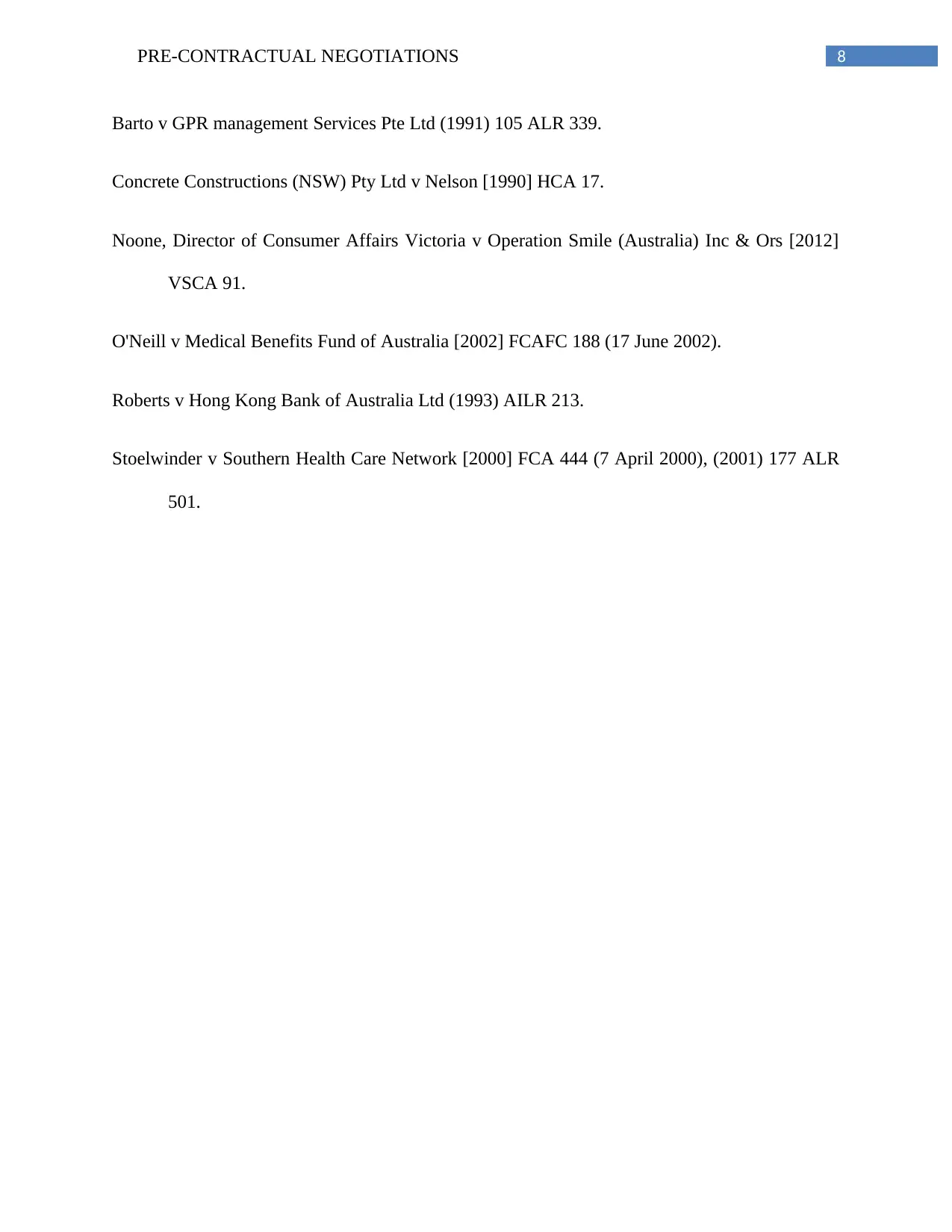
8PRE-CONTRACTUAL NEGOTIATIONS
Barto v GPR management Services Pte Ltd (1991) 105 ALR 339.
Concrete Constructions (NSW) Pty Ltd v Nelson [1990] HCA 17.
Noone, Director of Consumer Affairs Victoria v Operation Smile (Australia) Inc & Ors [2012]
VSCA 91.
O'Neill v Medical Benefits Fund of Australia [2002] FCAFC 188 (17 June 2002).
Roberts v Hong Kong Bank of Australia Ltd (1993) AILR 213.
Stoelwinder v Southern Health Care Network [2000] FCA 444 (7 April 2000), (2001) 177 ALR
501.
Barto v GPR management Services Pte Ltd (1991) 105 ALR 339.
Concrete Constructions (NSW) Pty Ltd v Nelson [1990] HCA 17.
Noone, Director of Consumer Affairs Victoria v Operation Smile (Australia) Inc & Ors [2012]
VSCA 91.
O'Neill v Medical Benefits Fund of Australia [2002] FCAFC 188 (17 June 2002).
Roberts v Hong Kong Bank of Australia Ltd (1993) AILR 213.
Stoelwinder v Southern Health Care Network [2000] FCA 444 (7 April 2000), (2001) 177 ALR
501.
⊘ This is a preview!⊘
Do you want full access?
Subscribe today to unlock all pages.

Trusted by 1+ million students worldwide
1 out of 9
Related Documents
Your All-in-One AI-Powered Toolkit for Academic Success.
+13062052269
info@desklib.com
Available 24*7 on WhatsApp / Email
![[object Object]](/_next/static/media/star-bottom.7253800d.svg)
Unlock your academic potential
Copyright © 2020–2026 A2Z Services. All Rights Reserved. Developed and managed by ZUCOL.





